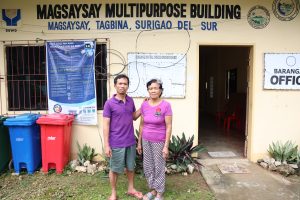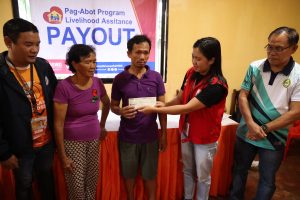For nine long years, a man who struggled to survive in the bustling streets of Metro Manila was believed to be lost to the world forever by his family back in the town of Tagbina, Surigao del Sur.
Meet Jerry Olayon Masudog, a 43-year-old Tagbinanhon who left the familiar comforts of home to seek better opportunities in Metro Manila, hoping to turn ambitions into reality. What he thought would be a smooth journey toward a better life soon unraveled into a struggle he never anticipated.

It was in the year 2000 when Jerry first set foot in Metro Manila, filled with hope and determination. He began his journey as a baker, even though he has little to no knowledge in baking. At first, he drifted from one bakery to another, struggling to adapt to the fast-paced, often unforgiving rhythm of city life.
“When I first got there, I honestly didn’t know what to do,” Jerry recalls.
“The city was overwhelming — the crowds, the noise, the pace of everything. I felt lost most of the time. But little by little, I learned to adjust,” he added.
The unfamiliar dynamics of urban living tested his resolve. But in 2002, Jerry finally found stability — landing a job at a small bakeshop in Tondo where he would dedicate the next ten years of his life. During that 10-year stretch, everything was smooth sailing for him —not until 2012.
Tensions began to rise between Jerry and a fellow baker, leading to a series of unresolved issues that eventually pushed him to quit his job. Disheartened but seeking peace, he returned to his hometown of Tagbina, where he spent the next three years working as a farmer. But just as he was beginning to find his footing, personal conflicts with his father disrupted the fragile stability he had rebuilt. Left with little choice, Jerry packed his bags once more and returned to Metro Manila, hoping to start over yet again.
“I truly wanted to stay and be with my family, but I didn’t want things with my father to get any worse. I thought leaving was the best way to keep the peace, so I made the hard decision to go back to Manila.” Jerry says quietly,
“Looking back now, it turned out to be one of the worst decisions I ever made,” he admitted.
In 2015, Jerry attempted to return to his previous job, hoping to pick up where he had left off. But to his dismay, he was turned away. With nowhere else to go and no clear plan, Jerry began drifting through the streets of Metro Manila, moving from one city to another with nothing but a fading sense of hope and a quiet determination to find work and rebuild his life.
Jerry eventually managed to catch a break, landing a job as a security guard in Tagaytay — but the respite was short-lived. Circumstances forced him to return once again to Metro Manila, where he found himself back on the grind, endlessly searching for any kind of work that could help him make it through another day. So he decided to ask for help to his brother who happens to live in Manila as well.
But it was not to be — his brother’s own situation was precarious, barely enough to support himself. Not wanting to become a burden, Jerry made the painful decision to leave and face the streets alone once again.
Year 2016 came, Jerry went completely off the radar.
No phone calls, no messages, no trace, all lines of communications vanished altogether. His family in Tagbina grew increasingly anxious. Each day that passed without news chipped away at their hope, replacing it with a quiet dread that perhaps Jerry was truly gone for good.
“I’ll never forget those times when I could barely sleep,” Jerry’s mother recalls.
“I kept thinking about him — where he might be, what could’ve happened. I had no way to reach him, no way to know if he was safe. The uncertainty was unbearable,” she reflected.
Jerry’s situation grew desperate. With no steady income and no support, he resorted to begging—asking for food or spare change just to survive from one day to the next, living each moment without any certainty that tomorrow would bring better fortunes.
His long and painful journey was finally nearing its end when, on February 7, 2025, while wandering the streets of Pasay City, Jerry stumbled upon the Walang Gutom Kitchen — a community feeding initiative and one of the flagship programs of Department of Social Welfare and Development (DSWD) Secretary Rex Gatchalian. Desperate for a meal, he mustered the courage to approach and ask for food, unaware that this simple act would become the turning point in his long and painful journey.
The staff at the Walang Gutom Kitchen struck up a conversation with Jerry, sensing that his story went far deeper than hunger alone. It quickly became clear to them that deep down; all he ever wanted was to go home. Moved by his situation, they wasted no time and immediately referred his case to the Pag-abot Program team — also a specialized initiative of Sec. Gatchalian aimed at helping individuals in street situations reintegrate into society.
“That was the moment I felt a spark of genuine hope inside me,” Jerry recalls.
“After all the years of being lost and invisible, someone finally saw me — not as a burden, but as a person worth helping,” he reflected.
In no time, the Pag-abot staff arrived, sat down with Jerry, and gently began to ask for more details about his life, his struggles, and how they could help him find his way back home. The team somehow found a way to contact his family — a moment that would become one of the most emotional turning points in his journey. On the other end of the line, his family was overcome with disbelief and joy. After years of fearing the worst, hearing Jerry’s voice again was nothing short of a miracle. The shock quickly gave way to overwhelming relief and happiness, as they learned that their long-lost loved one was not only alive, but eager to come home.
“I couldn’t believe it myself — I was in complete disbelief. Because for years, I already lost hope” Jerry’s mother shared.
The Pag-abot Program team wasted no time. They swiftly processed all the necessary documents and requirements to help Jerry return to his hometown. And on the 10th of March 2025—just over a month after they first met him—Jerry’s long-held dream finally came true. With nothing in his pocket but the hope of a fresh start, he was safely reintegrated into his home in Brgy. Magsaysay, Tagbina, Surigao del Sur, welcomed by the warmth of family and a community.
Building on the support Jerry had already received, the Pag-abot Program of DSWD Field Office Caraga extended another vital helping hand on May 22, 2025. Jerry was awarded a livelihood grant worth PHP 80,000, empowering him to establish his own bakeshop — a small bakeshop that will not only serve as his main source of income but also symbolize a new chapter: one filled with safety, dignity, and the peace he long sought after years of hardship.

“I sincerely thank the DSWD, especially the Pag-abot Program, for doing all the efforts to bring me back home. I am also deeply grateful to the Walang Gutom Kitchen, which played a crucial role throughout this entire process. Lastly, I want to express my heartfelt appreciation to President Ferdinand Marcos, Jr. and DSWD Secretary Rex Gatchalian for championing these meaningful and impactful programs that truly make a difference in the lives of Filipinos,” Jerry remarked with gratitude.
Jerry’s story is a compelling example to the very heart of what the DSWD strives for: uplifting the lives of the most vulnerable Filipinos. At the core of his extraordinary journey back from the fringes of society are the transformative efforts of the Pag-abot Program, strengthened by the pivotal intervention of the Walang Gutom Kitchen, whose simple act of providing a meal became the critical first touchpoint—proof that even the smallest gesture can lead to life-changing impact. Together, these programs show how compassion can go beyond aid, offering real reintegration and restoring dignity to those who need it most.

